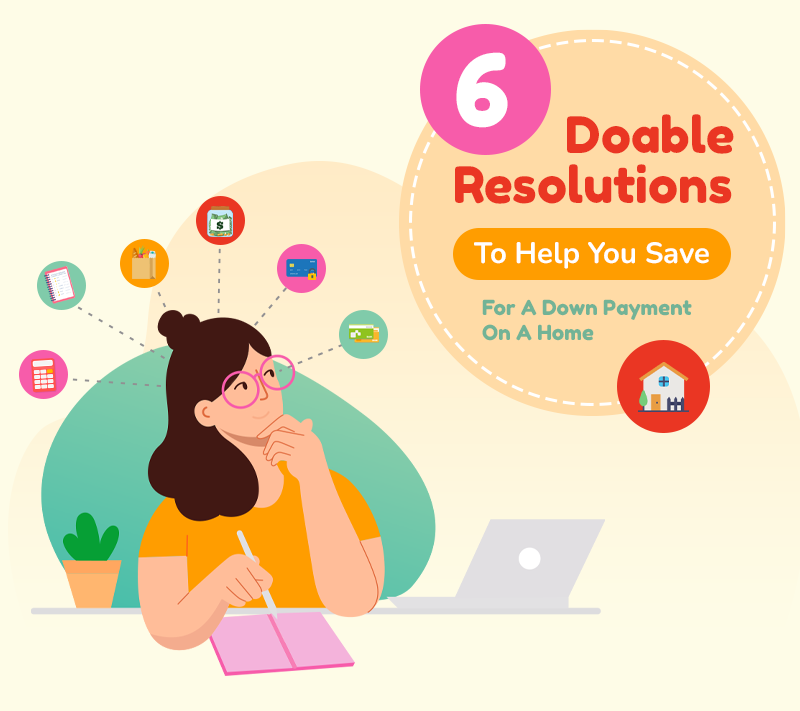6 Steps To Saving For Your Down Payment
There’s no doubt about it – saving money for your down payment on your first house can take a bit of doing. Sometimes, here in Seattle, WA it seems like no matter how much we save, the Seattle housing prices keep running away from us. Many home buyers find that their first home is not necessarily their dream home, but just getting their foot in the door allows them to “ride the tide” of the real estate market, and they end up building equity over time, which makes it easier to eventually be able to have the cash for the home of their dreams.

Having enough money to use as a down payment is one of the biggest roadblocks to purchasing a house, especially to first time buyers. If you’re one of the many people who aspire to turn their homeownership dream into a reality, you probably know that among the many things you need to start doing is to save money for a down payment. There are low- and zero-down loans available, so make sure you talk to us about whether you qualify for any of these programs as well…
However, saving up the amount of money you need is easier said than done and may be dependent on many factors, such as your income, current debt, responsibilities, etc. Even your current savings play a huge role in how much you still have to save.
So whether you’re planning to buy a home this year or even in 2022, here are six savvy ideas—you can even think of them as new year’s resolutions—to help you achieve your savings goals to buy your dream home sooner.

If you’re having a hard time sticking to your budget, start by seeing where your money goes to each month. Keep track of your daily purchases and payments through a spreadsheet or an expense tracker app, then review them at the end of each month. You may be surprised how much of your budget goes toward non-essential expenses that are making little dents in your account.

Since the pandemic started, many of us may have already been conscious about our spending habits. This time around, figure out how you can tighten up your spending by limiting or reducing your expenses. By making these small cuts or sacrifices in your daily routine, you’ll be amazed at how much money you can save, which is a huge deal if you really want to make your dream home a reality.
Here are some ideas to reduce spending, depending on what applies to you and your lifestyle:
- Minimize eating out and take out, and save them only for special occasions.
- Review and limit your monthly subscription services. Is your cable bill costing you hundreds of dollars a month, but you’re more of a Netflix guy? It might be time to totally cut it out.
- Cut down on designer coffee and other expensive beverages. Also limit your alcoholic beverages whenever you eat out. Water nourishes your body and your pocketbook!
- Reduce your clothing budget, especially if you’ve already been working frequently from home. Sweat pants are the new couture!
- Free time activities and hobbies: It might be time to find a less expensive hobby, or even a part-time job!

Speaking of reducing your expenses, there are ways to slash some dollars off your grocery bill and get huge savings. Shop smarter by sticking to your grocery list to avoid any impulse buys. It might also be helpful not to buy on an empty stomach. Choose to shop at grocery stores with cheap prices or at local farmer markets, rather than at an upscale grocer. Lastly, make an effort to switch to cheaper but quality store brand labels.

Any unexpected money that isn’t part of your monthly income are known as “windfalls” in the financial industry. These windfalls could be an annual bonus at work, inheritance, cash gifts, tax refund, a birthday check you received from your parents or grandparents, and any other instances in which you get extra money. Instead of spending them on a new gadget, appliance, or on a shopping splurge, stash them away as part of your down payment savings.
It might not look fun, yes, but remember that you’re working towards a more ambitious goal. That extra money is a surefire way to fast-track that goal. Likewise, it will be crucial just in case you encounter an unexpected expense and you can’t afford to deposit your usual savings. So if you’ve been itching to buy that latest big-screen TV using that holiday bonus, tell yourself that it can wait. Besides, chances are it will suit your new home better.

Challenge yourself to go on a spending freeze or a spending “diet”. Let’s say for two weeks or even a month, you will drastically cut your spending to only your living expenses and necessities—no new clothing, no dining out, no new gadgets, no adding to cart, etc. At the end of the month, review what areas of your budget are you willing to forgo to keep up with your new spending habits that will eventually increase your savings.

Creating a separate account for your down payment savings, with no linking debit card or checks, will help you keep your finances in order and track your progress. It will also discourage you from spending your hard-earned money on other things other than its purpose, which is to achieve your dream of becoming a homeowner. Automatic savings are your friend here. See how much you can spare ($200/month?) and put that into your savings account automatically each month. If the money never lands in your checking, you’ll be less likely to notice it’s gone, or spend it!
Where Do We Go From Here?

Saving for a down payment isn’t something that can be done overnight. It’s a huge, collective effort that can be achieved with enough determination and the right circumstances. To help you set a clear goal and determine how much you really need for a down payment, it’s better to talk with a local and knowledgeable real estate professional who will help you get started. Let us know when you’re ready to talk. Even if you’re months or years away from buying your first home, we are happy to help you plan ahead and prepare for the big step of home ownership, by coaching you through the little steps along the way.
